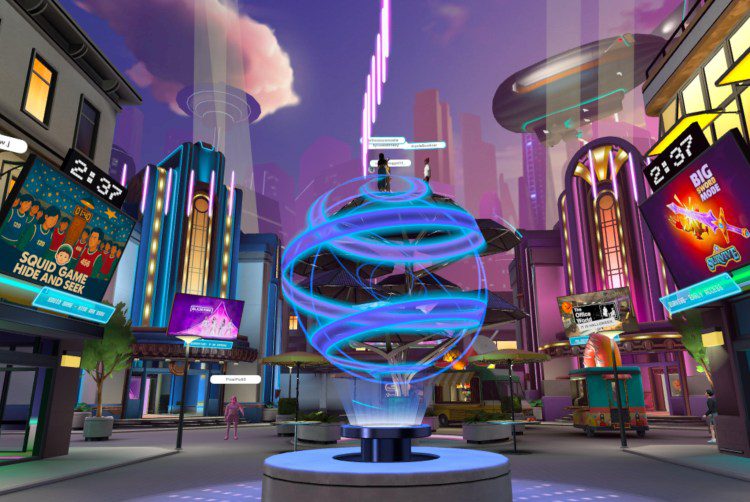
Meta is intensifying its efforts to establish a pervasive presence for its metaverse across various platforms and devices.
Introduction to Horizon Central
Horizon Central serves as the vibrant town square of Meta’s metaverse, showcasing the company’s commitment to creating an immersive digital environment. This virtual hub operates on the newly developed Meta Horizon game engine, which is designed to enhance user experiences and interactions within the metaverse. The engine aims to provide a seamless and engaging platform for users to connect, socialize, and explore various digital realms.
Meta’s Annual Connect Developer Conference
During Meta’s recent Connect developer conference, the spotlight was primarily on the new Ray-Ban Display glasses, a product that generated significant buzz among attendees and tech enthusiasts alike. These glasses represent a strategic move by Meta to integrate augmented reality (AR) into everyday life, allowing users to access digital content while remaining engaged with their physical surroundings. The focus on these glasses, however, meant that virtual reality (VR) advancements took a backseat during the event.
VR Developments and Collaborations
Despite the overshadowing of VR at the conference, notable developments were still highlighted. One of the most significant announcements came from filmmaker James Cameron, who is collaborating with Meta to bring 3D movies, shows, and sports events to the Quest headsets. This partnership underscores Meta’s ambition to enrich the VR content ecosystem, making it more appealing to a broader audience.
Understanding the Metaverse Vision
Meta’s vision for the metaverse extends beyond mere virtual interactions; it aims to create a comprehensive digital universe where users can engage in various activities, from socializing to attending events. This vision is rooted in the belief that the metaverse will eventually become a central part of daily life, much like the internet has transformed communication and information sharing.
Key Features of the Meta Horizon Game Engine
The Meta Horizon game engine is a crucial component of this vision, designed to support a wide range of applications within the metaverse. Some of its key features include:
- Enhanced Graphics: The engine supports high-quality graphics, providing users with a visually stunning experience.
- Interactivity: It allows for real-time interactions, enabling users to engage with each other and the environment dynamically.
- Cross-Platform Compatibility: The engine is designed to work seamlessly across various devices, ensuring that users can access the metaverse from their preferred platforms.
Implications for Users and Developers
The advancements in the Meta Horizon game engine and the introduction of new hardware like the Ray-Ban Display glasses have significant implications for both users and developers. For users, these developments promise a more immersive and interconnected experience within the metaverse. The ability to access VR content through various devices, including AR glasses, opens up new avenues for engagement and interaction.
Opportunities for Developers
For developers, the Meta Horizon game engine presents a wealth of opportunities to create innovative applications and experiences. The engine’s capabilities allow for the development of diverse content, ranging from games to social experiences and educational tools. As the metaverse continues to evolve, developers who leverage these tools will be well-positioned to capitalize on the growing demand for immersive digital experiences.
Stakeholder Reactions
The reactions from stakeholders within the tech industry have been mixed. While many express excitement about the potential of the metaverse, others remain skeptical about its practical applications and long-term viability. Industry experts emphasize the need for a clear value proposition to attract users and sustain engagement.
Concerns About Adoption
One of the primary concerns is user adoption. While Meta is investing heavily in the metaverse, questions remain about whether users will embrace this new digital landscape. Factors such as accessibility, ease of use, and the perceived value of virtual interactions will play a crucial role in determining the metaverse’s success.
The Future of the Metaverse
Looking ahead, Meta’s strategy appears to focus on creating a cohesive ecosystem that integrates various technologies and platforms. By combining VR, AR, and traditional digital experiences, the company aims to build a metaverse that appeals to a wide audience. This approach could potentially redefine how people interact with technology and each other.
Challenges Ahead
Despite the ambitious vision, several challenges lie ahead. Technical hurdles, such as ensuring seamless connectivity and interoperability between devices, must be addressed. Additionally, Meta faces competition from other tech giants also vying to establish their own versions of the metaverse. Companies like Microsoft and Google are investing in similar technologies, which could lead to a fragmented landscape if not managed effectively.
Conclusion
Meta’s commitment to making its metaverse ubiquitous is evident through its ongoing investments in technology and partnerships. The introduction of the Meta Horizon game engine and the Ray-Ban Display glasses marks significant steps toward realizing this vision. However, the path forward is fraught with challenges, including user adoption and competition. As Meta continues to innovate and expand its offerings, the future of the metaverse remains a topic of great interest and speculation within the tech community.
meta wants its metaverse everywhere Source: Original report
meta wants its metaverse everywhere
Was this helpful?
Last Modified: October 10, 2025 at 6:45 pm
0 views















